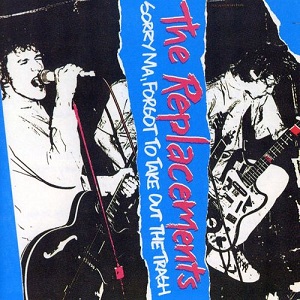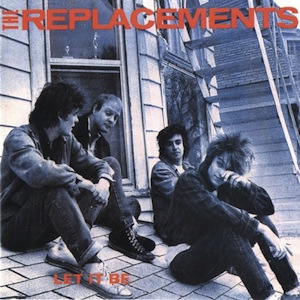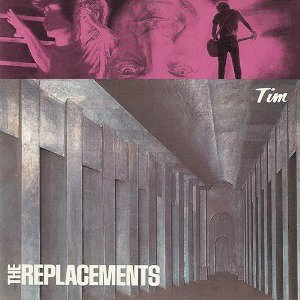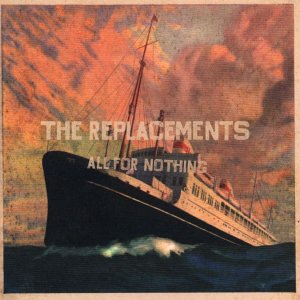
Many of us here at Popblerd are big fans of Prince. Undeniably, the Purple One reigns as the most recognizable Minneapolis musician of the 1980s. Yet while Prince, Jimmy Jam, Terry Lewis, and the rest of the paisley parade developed what became known as “the Minneapolis sound,” a number of bands such as Hüsker Dü, Soul Asylum, and The Jayhawks were forging their own brand of Twin Cities rock and roll. Among this later group are The Replacements. Noted for their undeniable talent and consistent inability to hold themselves together on stage, The ‘Mats (as they became known) had a roller coaster of successes, failures, cheers and jeers in their decade-long run. In that time, the band underwent personnel changes, stylistic shifts, label moves (so-called “selling out”), infighting, and alchoholism. Amid those obstacles, The Replacements managed to issue eight consistently pleasing albums, depending on who you talk to. Even within the group’s fanbase, there is much dissention as to the consistency of the group’s catalog. Some champion the band’s early punk efforts; others prefer their later, more intimate acoustic material (others think those last few records are shit). Some feel the band’s soul died when they moved to a major label (Sire) mid-decade, while others vehemently argue that this was in fact the band’s creative peak. Well aware of the opposing views on the band’s catalog, yet in agreement as to the band’s importance, the Popblerd staff decided that The ‘Mats would be perfect candidates for the next edition of Discography Fever. Read on and discover (or re-discover) one of our favorite rock groups of the 1980s, The Replacements.
 Sorry Ma, Forgot to Take Out the Trash (Twin Tone, 1981)
Sorry Ma, Forgot to Take Out the Trash (Twin Tone, 1981)
Gonzo: The ‘Mats first LP is at heart a punk album, as evidenced by the overly simplistic structure and breakneck speed of tracks such as “Customer,” “Otto,” “Hangin’ Downtown,” “Rattlesnake,” and “I Hate Music.” And while the band would retain its crass, snotty image throughout its next two releases, even in this punk-laden debut, there are glimpses of The Replacements’ eventual evolution. A few tracks on the predominantly punky Ma stand out in that they veer toward the slightly poppier side of rock. From tunes such as “Kick Your Door Down,” “Shiftless When Idle,” “Don’t Ask Why,” and “I’m in Trouble” (the group’s first single), it’s not too much of a stretch to hear hints of the band’s sound on later releases including Let it Be, Tim, and Pleased to Meet Me. Sorry Ma is very clearly The Replacements in their creative infancy. Yet it provides a solid starting point for a ragtag group of Minnesotans who would bring us nearly a decade of quality music.
Grade: B-
http://youtu.be/DkFYPM1p48c
 Stink (Twin Tone, 1982)
Stink (Twin Tone, 1982)
Gonzo: With songs such as “White and Lazy,” “Fuck School,” “God Damn Job,” and “Dope Smokin’ Moron,” Stink carried over the crass, juvenile snot-punk from Sorry, Ma. Although sonically, Stink has a much more cohesive production sound than its predecessor, the bulk of its 8 tracks are more of the same. Lyrically and stylistically, there is little on Stink that shows any real sense of artistic growth, and its songs are arguably interchangeable with those on Sorry Ma. This is to Stink‘s detriment, as it is ultimately an amusing, although not very interesting release. Where he EP does shine however, is in its opening track, “Kids Don’t Follow.” Prefaced by the voice of a Minneapolis cop shutting down a house party The ‘Mats were playing, “Kids Don’t Follow” is the one moment on Stink that hints at a new direction that the group might take. Although the song still lacks the depth that would eventually surface in the group’s lyrics and music, “Kids Don’t Follow” was one of the few early Replacements tunes to have a sense of message rather than crass lyrics worth a chuckle. It is in effect a youth anthem against the establishment (as the introduction so clearly illustrates). Stink may be a fairly inessential release, given the sense of one-trick-ponyism that it presents. However, it’s lack of creative progression does not prevent Stink from being a brief, enjoyable listen.
Grade: B
 Hootenanny (Twin Tone, 1983)
Hootenanny (Twin Tone, 1983)
Koomdogg: This album is a scattershot but fun affair that finds the Mats giving hints of their future sound while still providing the short blasts of punk rock. There’s plenty of quirk: The title track features the band members switching instruments, Paul Westerberg on drums, Tommy Stinson and Chris Mars on guitars and Bob Stinson on bass; “Mr. Whirly” is a takeoff on the Beatles song “Oh Darling”; and “Lovelines” features Westerberg reciting lines from personal ads. But there’s also signs of the more substantial Replacements: “Color Me Impressed” is in the pantheon of greatest Mats songs (and even greatest rock songs, period), “Willpower” is a mid-tempo rocker that provides an angry change of pace, and “Within Your Reach” is a contemplative Westerberg solo piece that years later ended up in the movie Say Anything. The band still provides its patented brand of rave-up fun on songs like “Run It,” “You Lose” and “Hayday.” There’s something for everyone at this Hootenanny.
Grade: B+
 Let It Be (Twin Tone, 1984)
Let It Be (Twin Tone, 1984)
Dennis: Simply the Replacements’ masterpiece and bridge from the bands’s past to its future, as Paul Westerberg’s songwriting began to mature, highlighted by the bitter take relationships in “Unsatisfied”. Musically, it’s a range of styles from the ragged punk of “Tommy Gets His Tonsils Out”, to the arena rock of “Black Diamond” to cabaret jazz in “Androgynous”. Rather than the career coda of the Beatles’ Let It Be, the Replacement’s Let It Be is the jumping off point to a whole new direction for the band.
Grade: A+
 Tim (Sire, 1985)
Tim (Sire, 1985)
Gonzo: The move from independent to major label is nearly always a controversial one among fans. Particularly when an act has become so highly regarded among its growing fanbase; particularly when your band’s identity is so wrapped up in your local music scene’s culture; particularly when you’ve just released what many critics and fans laud as a rock masterpiece; particularly when your next move is to deviate even further from your initial sound. Timwas in fact divisive among Replacements fans. Some claimed that the move to a major was indication that the band had “sold out,” and would now be catering to the whims of record execs rather than their creative instincts. Others agreed, pegging The ‘Mats move as one motivated by a desire to compromise their integrity by aiming for mass audience appeal (and money). And yet, most critics (including those who had followed the band’s career to date) hailed the album as a landmark achievement, evidence of a creative evolution and artistic maturity that in turn refined the band’s craft.
I tend to side with the critics on this one. For my money, Tim is the group’s best work, an 11 song outing that takes The ‘Mats’ approach from Let it Be even further. The group’s repertoire now included more subdued compositions, complemented by Westerberg’s increasingly introspective lyrics. Songs such as “Swingin Party” and “Here Comes a Regular” are drenched in a sense of isolation, heartbreak, and emotional desolation. Midtempo tunes including “Little Mascara” and “Left of the Dial” poetically sketch the sadness and disorientation of romantic separation (the latter has a special place in my heart given its metaphoric use of the noncommercial radio band). Still, there are plenty of rockers here too – “Hold My Life,” “Dose of Thunder,” and the anthemic “Bastards of Young” among them. Yet these rockers were not the staid, juvenile punk tunes that were the band’s foundations. They were something more akin to traditional American rock and roll. Not cliched mind you, but more firmly situating themselves within the historical narrative of Big Star, Johnny Thunders, Roy Orbison, and The Heartbreakers. The Replacements have many good albums, and a few truly great ones. In my opinion, there are none greater than Tim.
Grade: A

Pleased to Meet Me (Sire, 1987)
Koomdogg: Pleased to Meet Me is the Replacements’ first and only album as a trio, with founding member and lead guitarist Bob Stinson out of the band. While lacking Stinson’s guitar thunder and general edginess, the album makes up for it with a memorable collection of songs. From uptempo rockers like “Can’t Hardly Wait” and “Alex Chilton” to the suicidal protagonist of “The Ledge” to the acoustic lament “Skyway,” Paul Westerberg delivers the goods. “Valentine” and “I.O.U.” are also standouts, while “Shooting Dirty Pool” and “Red Red Wine” are boozy rockers in the Mats tradition. For better or worse, Pleased to Meet Me also paved the way for the more commercial, straight-ahead rock sound that characterized the band’s final two albums.
Grade: A-
 Don’t Tell A Soul (Sire, 1989)
Don’t Tell A Soul (Sire, 1989)
Dennis: A more polished, straight-ahead rock album than anything the Replacements had released with little trace of the band’s former punk glory (which is almost wistfully recalled in the opening track, “Talent Show”). The songs here are more introspective than on previous records, with Westerberg seemingly dissatisfied with all he sees (“Anywhere’s Better Than Here”, “We’ll Inherit The Earth”). Even the record’s best known track, “I’ll Be You” find Westerberg “bored right out of his skull” and looking for a change. As it turned out, this would be the last album recorded with all the bands’ members.
Grade: B
 All Shook Down (Sire, 1990)
All Shook Down (Sire, 1990)
Dave R.: There are people who will claim All Shook Down is the ‘Mats weakest album. They’ll say it’s more a Paul Westerberg solo album and that it lacks the rawness of Hootenany. Those people are fools. Westerberg could write any track from Sorry Ma Forgot To Take Out The Trash or Let It Be at any age. Only a world weary, broken hearted 31 year old could write a track like “Nobody” that still speaks, nay screams relevance to his now 40 something fans or his 50 something fans or his slightly older self. The album is full of pop master pieces that rival the Stones’ more down tempo gems like “Dead Flowers”.
“All Shook Down” is the album a man makes when he realizes he’s aging, that the promises of yesterday aren’t going to shine so bright and that the world, while different still has relevance and beauty. I understand the argument, the early Replacements albums were great because they didn’t care and Westerberg’s best lyrics were his most irreverent. All Shook Down is the album of a man that cares deeply. Some of his best songs are present on the album. From the bittersweet realizations of Nobody to the unbound joy of Bent Out of Shape to the complete and utter sadness of Sadly Beautiful and yes, to even that old irreverence in a track like Attitude All Shook Down is an album made by a man at the top of his craft. After this work, Westerberg shows moments of brilliance but nothing shines as bright or is as complete.
Look I could go track by track dissecting songs and inserting my opinion about why each is so brilliant that would be a huge disservice to you though. Instead I invite you to listen or re-listen. I think once you have you’ll realize that this rock masterpiece written by a punk brat all grown up should be spoken in the same circles as Exile On Main Street or Abbey Road or Blood On The Tracks.
Grade: A
 All for Nothing / Nothing for All (Compilation; Sire, 1997)
All for Nothing / Nothing for All (Compilation; Sire, 1997)
Dave R.: The Replacements have always had a split personality. On the one hand they’ve been a bunch of snot nosed punks singing irreverent tunes written to prove how little they care about, well, everything and their live shows only reinforced that in the early days. On the other hand they were the serious band led by song writer Paul Westerberg (that’s songwriter in the “one who crafts songs as a living and is generally accepted to be a genius at the craft). Occasionally the two halves mixed and produced pop gems like “Kiss Me On The Bus” or “Bastards Of Young”. Mostly they didn’t though which, in my opinion, may be the reason they never made it. The early fans wanted the punk rockers; the later fans the bitter sweet songwriter with his heart on his sleeve. “All or Nothing” does a fairly good job of showing both halves of the band.
No compilation is going to make every fan happy and attract new devotees. This collection is certainly no exception. It leaves off early studio recordings due to licensing issues and as a result is stuffed full of Warner approved tracks. That’s OK with me because it’s when they hit their stride. Disc one is chock full of radio ready songs and as close to hits as the ‘Mats could ever get. Disc two is full of rarer pieces that cater to fans of the punk rock band that wore bad plaid suits when they turned up to play live. For my money disc one is the one that matters. It’s a great set list and one that could be looped forever without ever getting old or stale. Young love, heartbreak, bitter sweet memory, political rage, a yearning for more, even the acceptance of a child’s goodbye…it’s all right there. I can think of no better way to dip your toe into the Replacement pool, OK maybe a compilation I’ve exec produced that included Westerberg’s solo work as well. Other comps may contain a wider selection of albums or a reunited band. They aren’t quite as good. Toss the second disc or use it as a coaster for that beer with breakfast but savor the wonder that was The Replacements, the band that should have made it and never did, nothing proves it more than disc one.
Grade: B-
Want more? Check out our Replacements Spotify playlist!
Discography Fever: The Replacements

1 comment
King P says:
Aug 8, 2012
Salvage that bonus disc from “All for Nothing” and give it a spin, Dave! I’m a sucker for the hits but
the extras on that double CD are some of my favorites. “Portland,” the alt version of “Can’t Hardly Wait,” “All he Wants to Do is Fish. . . .” etc. If you loved the stumblin’ drunk Replacements, how could you not like “Rolling Pin?” It’s all gold.